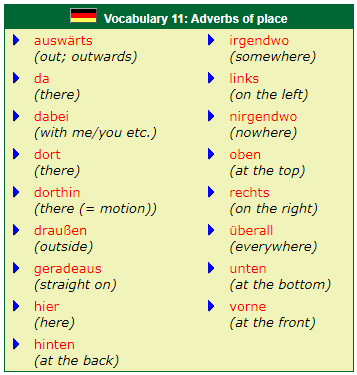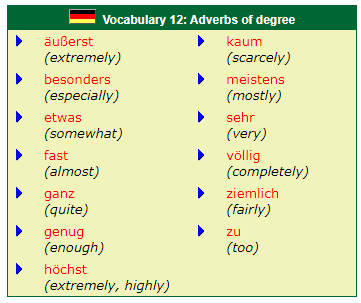
Adverbs of degree
There is a further group of adverbs which precede other adjectives or adverbs to emphasise or tone down the word which they are qualifying. These are known as adverbs of degree.


Notes
Adverbs of degree qualify other adjectives or adverbs but do not themselves add endings. Like all adverbs they are invariable. For example:
Es ist sehr neblig und äußerst kalt.
(It is very foggy and extremely cold.)
Im Frühling ist es besonders stürmisch.
(In spring it is particularly stormy.)
Sein neuer Film ist ganz gut.
(His new film is pretty good.)
Im Sommer ist es ziemlich trocken und oft zu heiß.
(In summer it is pretty dry and often too hot.)
In der Nacht kann ich kaum sehen.
(I can hardly see at night.)
Die Ärztin ist etwas nervös.
(The doctor is a little nervous.)
The only exception to this pattern is the adverb "genug" (= enough), which as in English follows the adjective or adverb which it qualifies:
Es ist heute warm genug.
(It is warm enough today.)
Das Fahrrad war nicht gut genug.
(The bicycle wasn't good enough.)
 英语
英语 日语
日语 韩语
韩语 法语
法语 西班牙语
西班牙语 意大利语
意大利语 阿拉伯语
阿拉伯语 葡萄牙语
葡萄牙语 越南语
越南语 俄语
俄语 芬兰语
芬兰语 泰语
泰语 丹麦语
丹麦语 对外汉语
对外汉语

